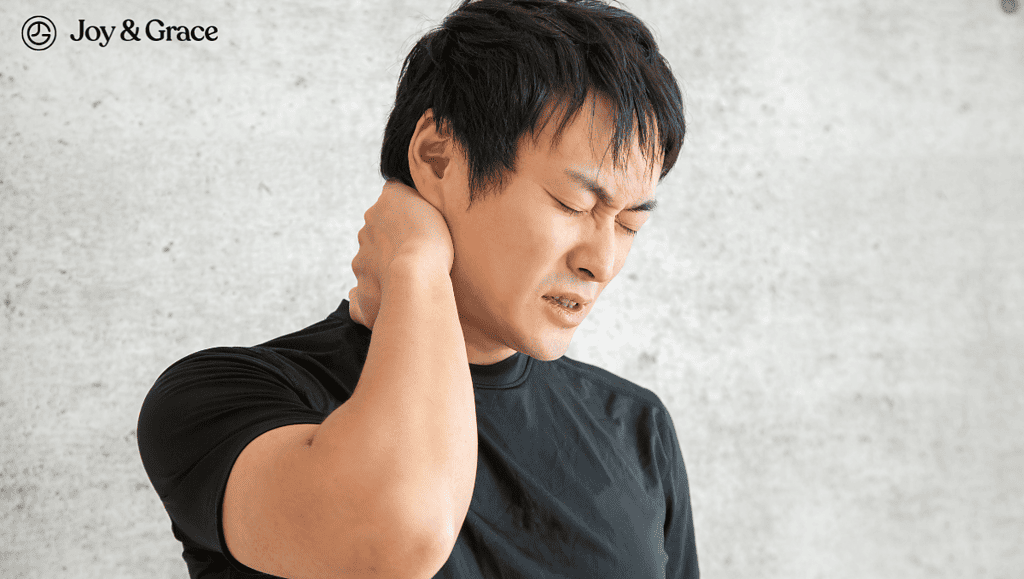It can be frustrating to have neck pain after falling. Accidents happen. An unexpected mishap can happen to anyone. Neck pain is a common symptom after a fall. On the mild spectrum, it can be highly uncomfortable. But in a more severe case, it can be debilitating.
But can neck pain indicate something more serious? This article will discuss the different aspects of neck pain after falling.
Can Falling Cause Neck Pain?
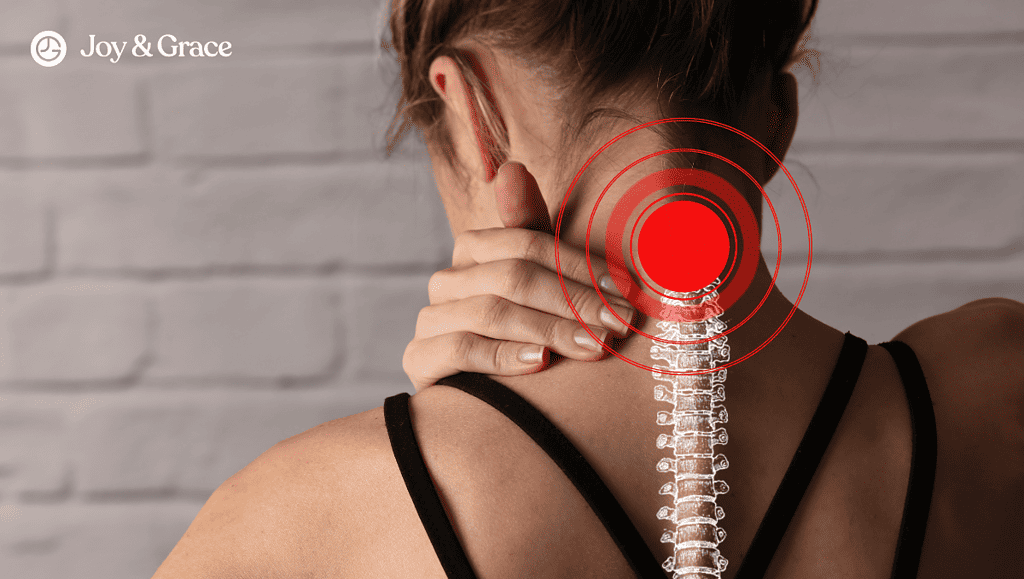
The answer is yes.
If you've ever experienced a fall, you know the experience can be quite jarring. It can result in a variety of injuries as well, which are mostly whiplash injuries.
Nevertheless, one of the most common complaints is neck pain. In fact, according to a study we reviewed, neck pain can persist for weeks. It can even become chronic and cause persistent pain in about 10% of people.
Why Does My Neck Hurt After Falling? Can a Fall Damage Your Neck?
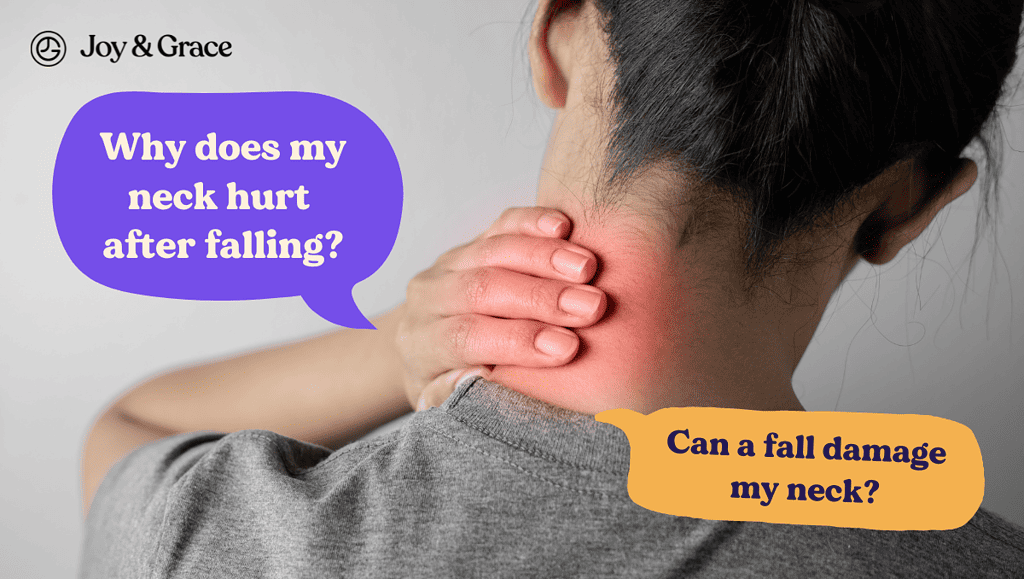
Various factors can cause neck pain after falling. According to a study, the causes behind the pain are often related to the degree of impact (mechanical conditions). It could be due to a muscle strain (pulled muscle) or sprain (damage to the ligaments and tendons), or it could be a sign of a more serious type of injury, such as a spinal cord injury.
That said, neck pain after falling down is caused mostly by whiplash injuries and rarely spinal injuries.
Symptoms of neck damage after falling can vary depending on the severity of the injury. The most common symptoms include:
- Neck pain
- Headache
- Dizziness or vertigo (the feeling that you are spinning or moving even when you're not). This can also be experienced as a loss of balance
Still, neck pain remains by far the most common symptom. For example, in a study of 351 emergency department post-traumatic patients, the main symptom was an immediate onset of neck pain and tenderness.
Another symptom is feeling a stiff neck, which makes it hard to move your head (limited range of motion). You may also feel numb or tingly. Feeling numb or tingly could be a sign of nerve damage.
How Do You Know if Your Neck is Sprained?
It's not always easy to tell if you've really hurt your neck or if you're simply experiencing temporary stiffness. A neck sprain occurs when the structures (particularly the ligaments) in the neck are stretched or torn, typically due to a sudden movement or impact. Some common signs that you might have sprained your neck include:
- Pain,
- Stiffness,
- Limited range of motion, and
- Muscle spasms.
It is very important to pay attention to these symptoms. They could be signs of a bigger problem that needs professional help.
That said, it's important to remember that not all neck pain indicates a sprain (damage to the ligaments and tendons). Many factors, such as poor posture, stress, or muscle strain (pulled muscle), can also contribute to discomfort in the neck area.
How Long Does it Take For a Neck Strain to Heal?
Following a muscle injury, the complete recovery usually takes 4-6 weeks. However, there’s variation in this time frame, and everything depends on how bad the injury is and how healthy the person is.
For example, mild neck strains may resolve quickly within a few days to a week. Conversely, more severe injuries could take several weeks or even months to heal.
It may be tempting to look for a clear answer to how long it takes for a neck strain to heal. However, it's important to remember that everyone's experience is different. And that the key to a good recovery is to put self-care and professional advice first.
When Should I Worry About Neck Pain After a Fall?
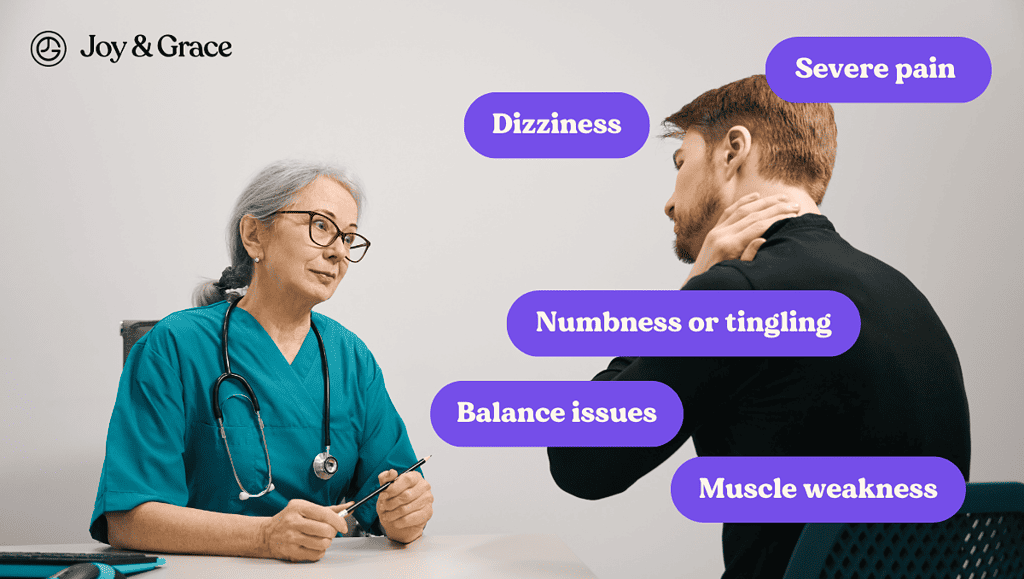
Neck pain can sometimes be caused by a minor strain or bruise that will go away with time and the right self-care. However, certain symptoms could indicate a more severe neck injury that warrants prompt medical care.
You should be particularly vigilant if your neck pain is accompanied by other symptoms or worsens over time. Some warning signs that may warrant further investigation include:
- Severe pain that doesn't improve with rest or pain medications,
- Difficulty moving your head, numbness or tingling in your arms or hands,
- Muscle weakness,
- Dizziness, or
- Balance issues.
Additionally, if you have trouble eating or breathing, that could indicate a more serious problem.
Some studies suggest that if the pain is associated with head movement immediately after a fall, it may be a sign of a more serious injury (usually a neck sprain) that immediately needs medical help.
Other Commonly Asked Questions About Neck Pain After Falling Down
How Long After Fall Does Neck Pain Start?
You’ll usually notice mild discomfort or stiffness soon after a fall.
But it's also important to know that not everyone will feel pain right away after a fall. This delay in pain may be due to:
- Inflammation and muscle tension (masking the pain)
- Release of endorphins. When you get hurt, your body naturally makes endorphins. It is a hormone that soothes pain and makes you feel better, even if only for a short time.
The delay in pain onset may be longer for older individuals. For example, in a case study of a 64-year-old woman, neck pain and headaches were reported to appear two and a half months following a fall.
Can You Fracture Your Neck Without Knowing?
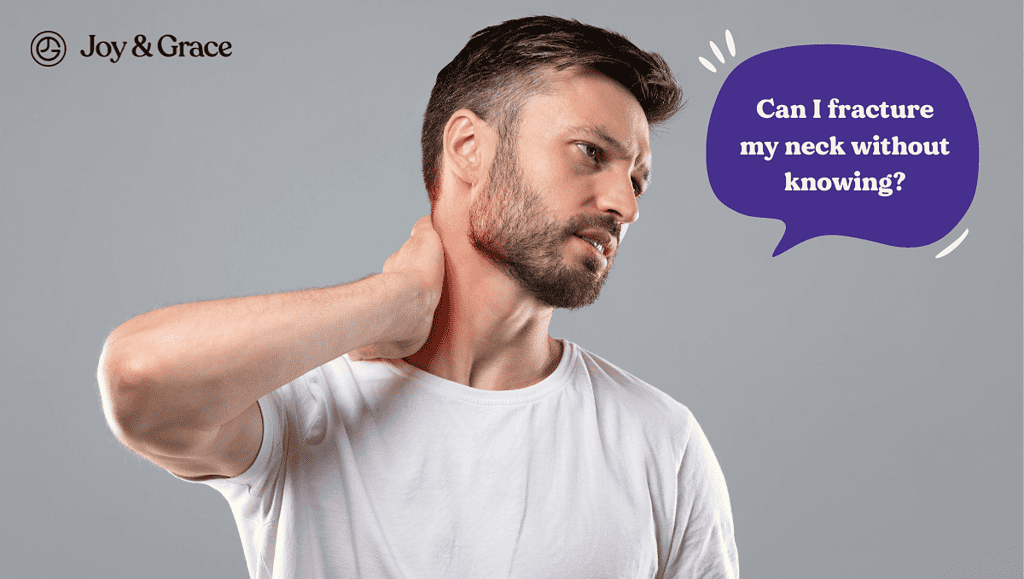
Undiagnosed neck fractures (specifically “cervical spine fractures”) rarely occur following a hard fall.
In a study with 351 patients complaining of post-traumatic neck pain, only 2% had proven fractures.
This means that diagnosed cervical fractures are rare on their own, and these are hard to overlook.
But because, in some instances, X-rays are not recommended on all patients, especially if they are alert, awake, and do not complain of immediate neck pain, neck fractures may (again, very rarely) go undiagnosed.
What Does a Fractured Neck Feel Like?
If you fracture your neck, you will experience severe pain, swelling, and numbness in your arms and legs. You shouldn't be moved and should head straight for the hospital.
Since the spinal cord runs through the middle of the vertebrae and ties the brain to the rest of the body through the central nervous system, any damage to it can be very bad. When the spinal cord is hurt, it can lead to paralysis or even death. Injuring the spinal cord at the cervical spine level can result in temporary or permanent paralysis of the entire body from the neck down.
Can Falling And Hitting Your Head Cause Neck Pain?
It is important to understand that the head and neck are interconnected, and an injury to one can easily affect the other. The head is supported by the neck and its complex network of muscles, ligaments, and vertebrae.
When a person falls and hits their head on the ground, the force of the hit can also be passed to the neck, placing stress or hurting the structures that support the head.
Hence, head injuries can indeed cause additional issues, such as neck strains (pulled muscle), neck sprains (damage to the ligaments and tendons), or even herniated discs.
Is It Normal for Your Neck to Hurt After Hitting Your Head? Why Does My Neck Hurt After Falling and Hitting My Head?
Yes, it is a normal post-injury experience to have neck pain after hitting your head. Again, the head and neck are intricately connected, with numerous muscles, ligaments, and vertebral bones working together. This means that an impact on one can affect the other. Also, the body's natural reaction to a fall is to stiffen up, which can lead to muscle tension and pain in the neck area.
What Are the Symptoms of a Herniated Disc in the Neck?
The most common symptom of a herniated intervertebral disc in the neck is pain along with ipsilateral (same side) pain or numbness, which is called a radicular (“nerve root”) symptom. However, this could vary for everyone.
It should also be noted that the symptoms appear based on the location of the herniated disc. Hence, additional symptoms such as scapular and shoulder pain and weakness in the muscles supplied by the nerve affected may also appear.
What Does a Torn Ligament in the Neck Feel Like?
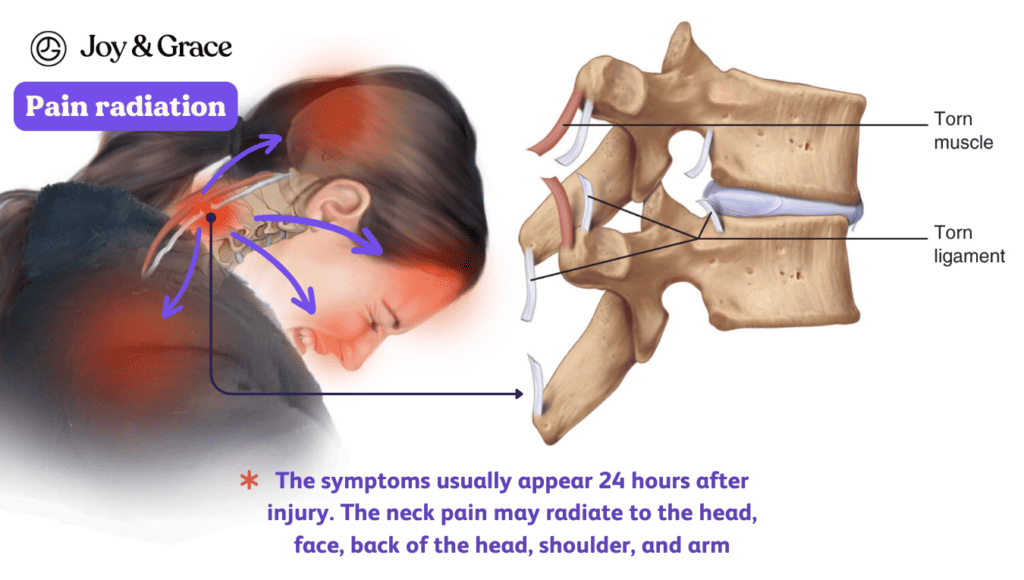
In whiplash injuries, neck sprain (stretched or torn ligaments) is common. The symptoms usually appear 24 hours after injury. The neck pain may radiate to the head, face, back of the head, shoulder, and arm. In some cases, a decrease in the range of movement may be felt due to prolonged muscle contraction (muscle spasm).
Torn ligament pain is intense and debilitating. Unfortunately, torn ligaments can even lead to chronic pain in some cases.
How Do You Know if You Have Pulled a Muscle in Your Neck
When you suspect you've pulled a muscle in your neck, it's essential to recognize the signs and symptoms to understand your condition better. A pulled neck muscle, also known as a neck strain, typically manifests as pain and stiffness in the affected area.
This discomfort may intensify when moving the neck or turning the head. Additionally, you might experience:
- Muscle spasms,
- A decreased range of motion,
- Swelling.
In some cases, the pain could radiate to your shoulders or upper back, making it difficult to pinpoint the exact location of the injury.
Management, Treatment, and Prevention - How Do You Get Rid of Neck Pain After Falling?
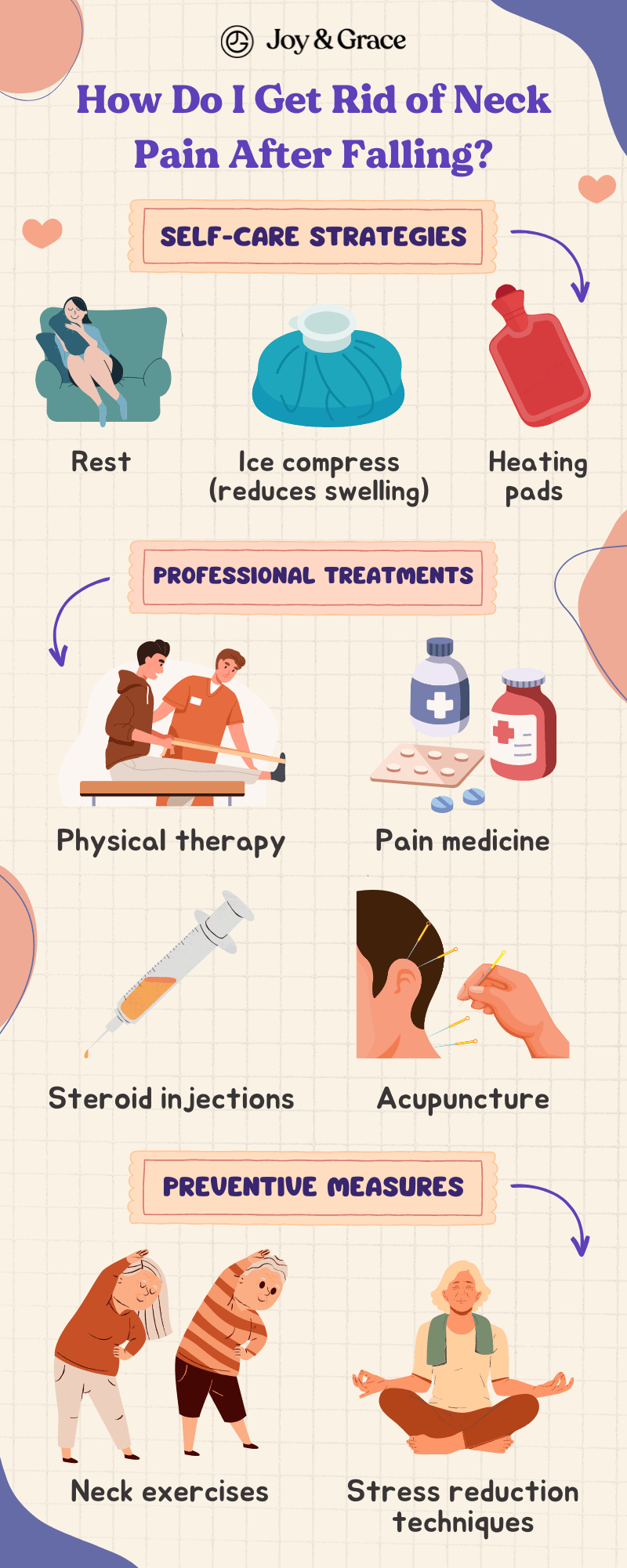
Resting and recovering from a fall is essential, especially if you've experienced neck pain. Most neck pains after falling gradually resolve and improve at home. However, management and treatment options include the following:
- Rest and try not to move the neck extensively. These should be done to minimize or prevent further injury.
- Physical therapy
- Ice compress (reduces swelling)
- Heating pads (after some time, to reduce muscle tension)
- Pain medicine (including anti-inflammatory medications)
- Steroid injections
- Alternative therapies, such as acupuncture
- Stress reduction techniques
- Neck exercises (however, do not attempt any activities on your own without talking to your healthcare provider first)
Takeaway
Neck pain after a fall is common and can indicate various common injuries, including whiplash. While most cases resolve within a few weeks, it's important to be aware of warning signs that may require medical attention, such as severe pain, numbness, weakness, or balance issues.
Rest, ice compresses, and medication can help manage neck pain, but professional guidance should be sought for a proper diagnosis and medical treatment plan. Remember to prioritize self-care and consult a medical professional for personalized advice.
